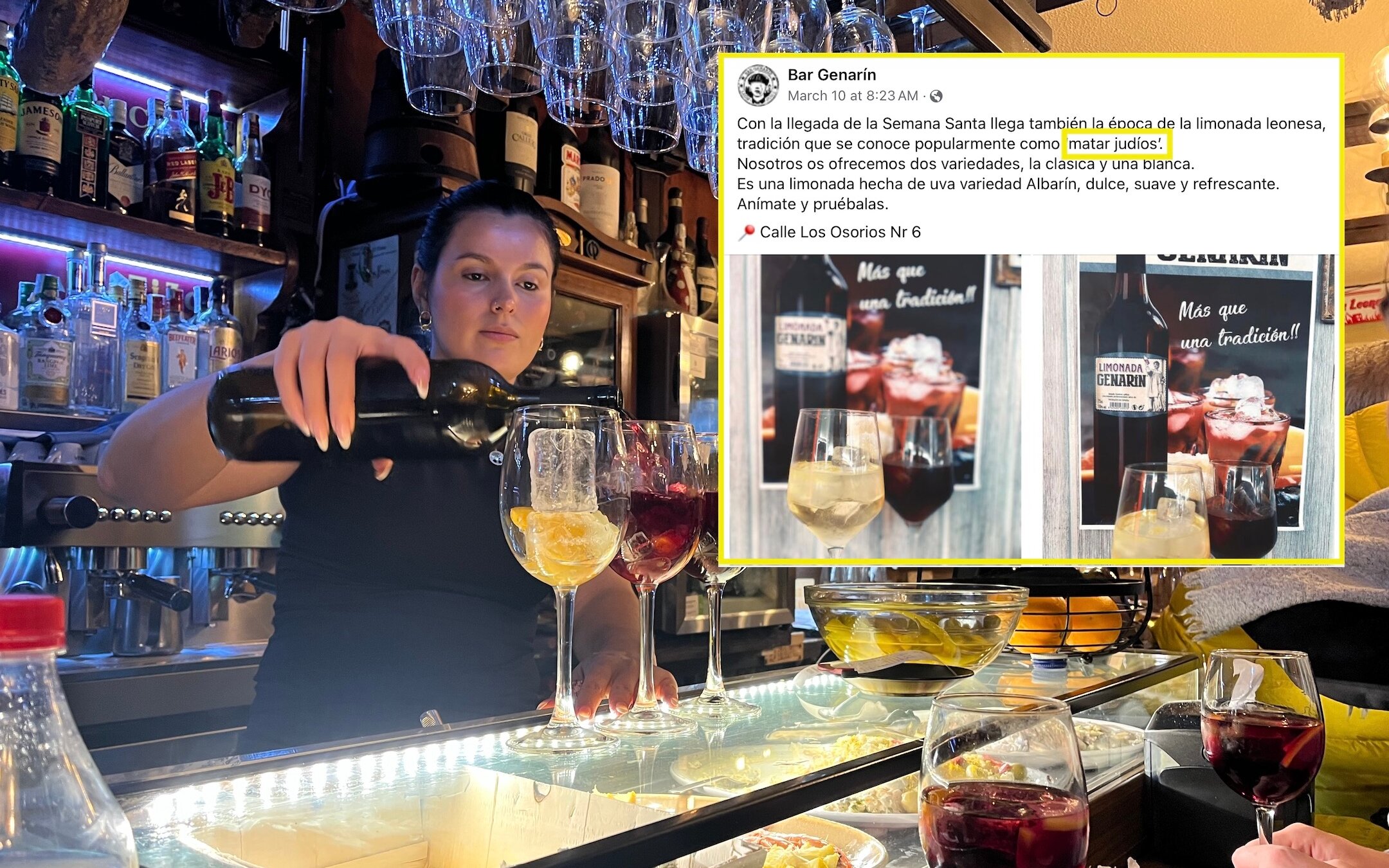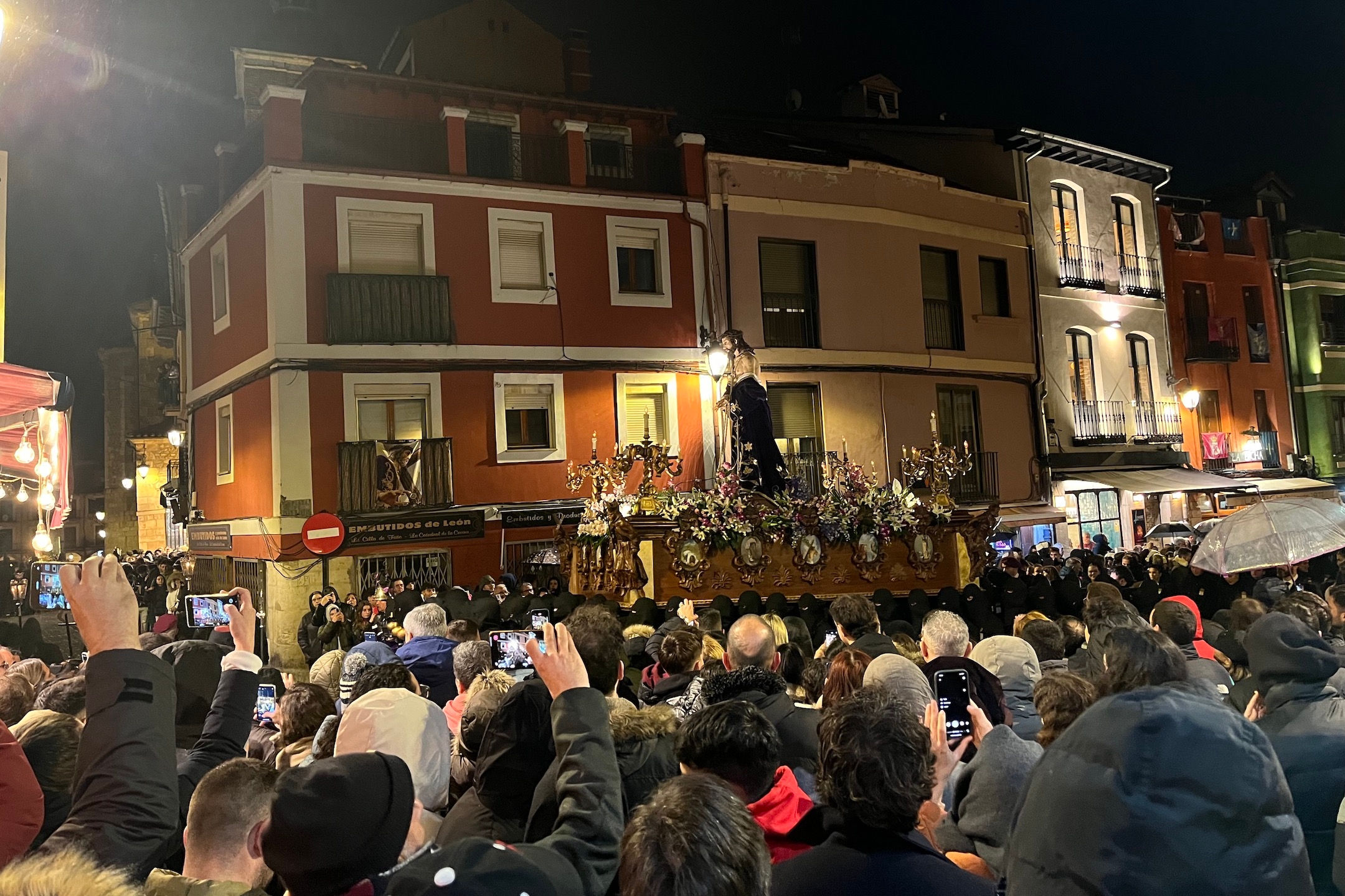In the Spanish town of León, locals toast Easter with a ‘Kill Jews’ cocktail
“It’s strange to foreigners,” said a server rushing plates and glasses to customers at a local tapas bar. “Here it’s normal.”

Some bars in León, Spain advertise that they serve “Mata judios” cocktails, though most menus say “limonada.” (Shira Li Bartov)
LEÓN, Spain (JTA) — It’s the week before Easter in León, an ancient city in northwest Spain, and locals have poured into the streets to knock back glasses of wine-lemonade, an annual festivity that’s sometimes punctuated with a cheerful cry: “Matar judíos,” or “Kill Jews.”
“Semana Santa,” or Holy Week, is the most important religious period in Spain. León’s celebrations are particularly spectacular, marked by 10 days of music, sermons and about 30 processions, featuring some 16,000 penitents. It’s also a high season for visitors — in 2002, the city’s Holy Week was declared a “Festival of International Interest for Tourists.”
One fixture of these frenzied days is a Leonese cocktail made from red wine, lemons, cinnamon and sugar, sometimes with oranges and figs. Here it is called “limonada,” and virtually every bar in Barrio Húmedo, the city’s nightlife-packed medieval quarter, is plastered with signs advertising their version. It’s local tradition to drink 33 limonadas during Holy Week, representing the age of Jesus when he was crucified.
It’s also a centuries-old tradition for revelers seeking limonadas to say they are going out to “kill Jews.”
“It’s an expression here,” Margarita Torres Sevilla, a professor of medieval history at the University of León, told the Jewish Telegraphic Agency. “For example, you tell me, ‘Have a drink with me? Okay, let’s go kill Jews.’ Another typical sentence of Holy Week is, ‘How many Jews have you killed? Three, four, five [limonadas]? Oh, you have killed a lot.’”
In León, a city of about 124,000 that has no visible Jewish community, locals told JTA the phrase is not seen as vulgar or antisemitic. Some bars celebrate it as a point of pride in the city’s heritage, using the phrase as a hashtag when advertising their seasonal specials on social media.
“With the arrival of Holy Week also comes the season of Leonese limonada, a tradition that is popularly known as ‘killing Jews,’” said a Spanish-language Facebook post from Bar Genarín on March 10. “We offer you two varieties, the classic and a white.”
“It’s strange to foreigners, but they take it with a laugh,” said Sonia Da Costa, a server rushing plates and glasses to the swell of customers at Cafetería Chamberí, a local tapas bar. “Here it’s normal.”
The historic Jewish quarter of León, which has not seen a Jewish population in hundreds of years, comprises two streets embedded in the very Barrio Húmedo overflowing with limonadas today. Few traces indicate where the community lived; its three medieval synagogues were lost, the final one commemorated by a small plaque recently installed on Misericordia Street: “The third Jewish synagogue of León was built here (1370-1481).” On a side street branching off León’s central square, one stone doorway bears two vertical markings, which Torres Sevilla believes were left by a mezuzah.

One of León’s historic synagogues is marked with a plaque. There are no Jews living in León today. (Shira Li Bartov)
Jews settled in the area starting in the 10th century. León produced Moses de León, a famed Jewish mystic, and became a center of Jewish religious thought. Jews lived in relative equality to León’s Christians, interrupted by sporadic spurts of violence, until 1293, when King Sancho IV banned them from owning farmland. Two decades later Jews were forced to wear a yellow badge, and starting in 1365 they had to pay a special tax, similar to one borne by Muslims.
The expression of “killing Jews” on Holy Week goes back to an episode in the 15th century, according to Torres Sevilla. León was economically devastated by war and the Black Death, leaving many Christian noblemen in debt. One such knight, Suero de Quiñones, owed payments to a Jewish merchant. To avoid paying his debt, Quiñones whipped up a religious fervor against León’s Jews on Holy Week in 1449. He organized a group of knights to attack the Jewish quarter, murdering the lender and several others on Good Friday.
“Quiñones said on Holy Week, our Lord was accused by the Jews and the Jews killed him,” said Torres Sevilla. “So what do we do with the Jews? Kill them. But the real reason was not a Christian motive — the real reason was that he had an important debt to an important merchant of the Jewish community.”
To celebrate their supposed vengeance for the death of Jesus, Quiñones and his allies went to drink wine in Barrio Húmedo. Thus commenced the ritual of downing limonadas to the refrain of “killing Jews,” said Torres Sevilla.
Other stories say the phrase emerged from the taming powers of limonada, authorized by medieval leaders in the midst of Holy Week’s abstinence and fasting to stop Christians from committing pogroms against Jews — by keeping them occupied in the taverns.

Processions reenacting the crucifixion and resurrection of Jesus are a centerpiece of Holy Week in León, Spain. (Shira Li Bartov)
(The Leonese tradition of “Matar judíos” does not appear to be connected to the Spanish town about 150 kilometers east that was called Castrillo Matajudíos — or Fort Kill the Jews — from 1627, during a period of antisemitic persecution, until a few years ago.)
The region’s Jewish community did not last long after Quiñones’s attack. Jews were expelled from León in 1481, and 11 years later, under the Alhambra Decree of King Ferdinand II and Queen Isabella I, from all of Spain. Some historians have also linked limonada’s association with “killing Jews” to a quote attributed to Ferdinand, upon signing the expulsion decree in 1492: “Limonada que trasiego, judío que pulverizo” (“Limonada that I decant, Jew that I pulverize”).
Today, residents say the phrase is a social custom devoid of any connection to murder, religion or real-life Jews.
“People are used to it here, it’s an expression that is not racist at all,” said José Manuel, who works at Vychio Cafe Bar. “It’s an expression from a time period of racism but now, no, it’s an expression out of custom.”
Torres Sevilla said that a Jewish past lies dormant in León, even inside locals who may not know their own history. While tens of thousands of Jews fled Spain as a result of the Alhambra Decree, thousands others stayed and converted. Torres Sevilla believes she is among the Spaniards descended from “conversos,” who preserved some distinct traditions despite becoming Christian. “Sevilla” is a historically Jewish surname. Her family goes to church on Saturday — not Sunday — and begins prayers on Friday, the Jewish Shabbat. She grew up with a ritual, also found in other “converso” families, of cleaning the home and having clean clothes ready before Saturday.
Many Leonese Jews stayed and converted after 1492, she said, but their descendants may have no idea — and may even be among those calling to “kill Jews” with their limonadas on Holy Week.
“Everybody knows about ‘kill Jews,’ but nobody knows about the Jewish history of León,” said Torres Sevilla.
This article originally appeared on JTA.org.






















